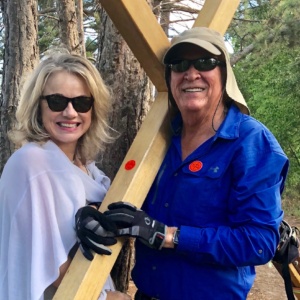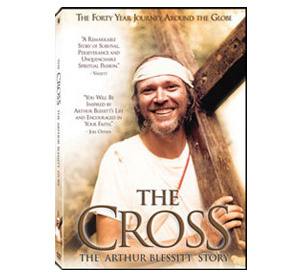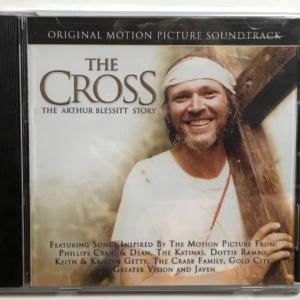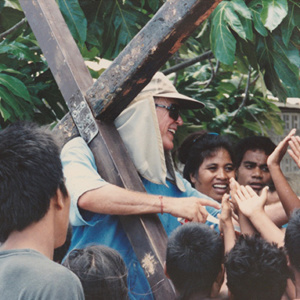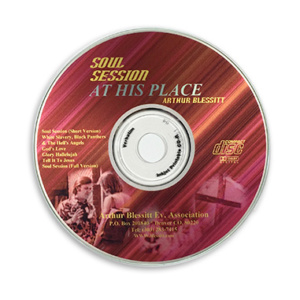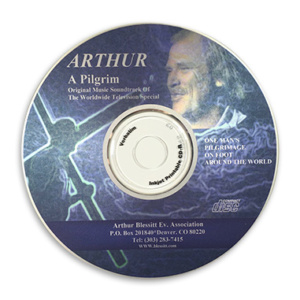THAT HIS HOUSE MAY BE FULL
The steel door of the bullpen at the county jail in Jackson, Mississippi, clanged shut behind me with an echoing bang.
I was alone in the cavernous holding facility with more than one hundred men, all black, charged with everything from jaywalking to murder.
Here certainly was a captive audience for the message of Christ I was there to preach.
I moved tentatively toward the center of the giant cell, Bible in hand, and looked for a friendly face.
I might as well have been invisible.
The men were sleeping, playing cards and checkers, reading newspapers and magazines, and a television set and radio were blaring simultaneously. A few were staring at the ceiling, wondering perhaps what kind of justice would be meted out to them in Jackson’s tough, no- nonsense courts. Segregation was still officially sanctioned in the city, though thousands of Jacksonians were privately against persecution of the African American.
I had agreed to stay locked in with the prisoners for forty-five minutes, and the time yawned ahead of me. Surrounded by indifference, I wondered, Lord, what am I going to say, what am I going to do, how am I going to reach anyone for Thy glory?
It was worse than I had thought it would be. A few hours before I’d been sitting in my room at the dorm when a fellow student, Johnny Dollarhide, walked in and said, “Five of us are going down to the jail. Want to come along?”
“What will I have to do?”
“Witness and preach.”
“I wouldn’t know what to say or do. I’ve never witnessed in a jail. Can I just stand around and watch and listen?”
“Fine,” Johnny said.
As soon as we arrived the others fanned out quickly to various parts of the jail: solitary, the juvenile section, and the individual cells of men already convicted and sentenced to death awaiting transfer to state prison.
I found myself alone with Johnny in the corridor between two huge bullpens, one for whites, one for African Americans.
“Which do you want?” Johnny said.
“Neither. I told you I just wanted to watch and listen.”
“Well, Arthur, you have to take one of them. Make up your mind.”
Before I could protest further, Johnny added, “If you want to let one group of these men die and go to Hell, then you can come and watch me. If you want to try to save souls, then you’ll go into one of these bullpens.”
I happened to be standing closer to the African American cells, and after a hesitant glance at Johnny, I told the jailer, “I’ll go in here.”
Thus my unheralded entrance and my dilemma. How could I capture the attention of these oblivious men?
“We’re going to have a preaching service,” I announced in a tiny, unsure voice.
Nobody heard or if they did they couldn’t have cared less. From the nearby white bullpen I could hear Johnny’s loud, confident voice. He was preaching up a storm.
I tried again, “I’d like you all to gather around and listen to the message of Jesus.”
No one moved.
I was desperate. I had to do something. I decided to emulate Johnny and began to shout at the top of my lungs from John 3:16. “‘For God so loved the world, that he gave his only begotten Son, that whosoever believeth in him should not perish, but have everlasting life.'”
A few heads turned in my direction, faces mirroring mild interest.
Nervous and unsure, I flipped furiously through the Scripture, quoting passages at random from Genesis to Revelation. At last three or four men came over and sat down in front of me. The television and radio were still shouting their afternoon inanities, so I pitched my voice as high as I could and began to preach. It was the longest sermon I had ever delivered, a ragged, rambling, jack-rabbit of a sermon skipping from point to point without coherence or continuity.
I preached about everything I knew until I ran out of things to say. Then I began repeating myself.
My efforts were a total disaster.
Finally, I called out, “If anyone wants to be saved, come up here, stand beside me and let me pray for you.”
One thin man in a tattered shirt, brown eyes twinkling from an onyx face, stepped forward. “I’d like to be saved, preacher,” he said.
As I brought that man to the Lord there wasn’t a happier soul-winner anywhere in the world. After the prayer, the newly saved man said, “Thank you. Maybe it doesn’t look like it, but we all appreciate your being here. A lot of these men are good Christians and the rest of them will get right with the Lord one day. Come back again.”
One man saved among more than a hundred. I hadn’t exactly set Jesus’ torch to that bullpen, but at least than one man had been spiraled into Heaven.
Each Thursday from then on I returned to the jail to witness. On every visit I led at least one prisoner to the Lord, white and black men scheduled for execution, lifers, others sentenced to ten, twenty, and fifty-year terms.
These witnessing missions were the most exciting part of my life at Mississippi College, where I had enrolled because I knew I would meet others who wanted to spend their lives doing God’s work. Of the two thousand-member student body, about two hundred of us planned to go on to seminary.
I was interested and did well in some of my courses Bible study, history, political science, and speech. But I was a washout in foreign languages. As the semesters rolled by, I flunked Spanish three times and French twice. It really wasn’t important to me that casa means house and plume was the word for pen. It seemed stupid to waste my time on such trivia when there was a world of people outside that needed Jesus.
The school, founded in 1826 and one of the oldest in the United States, was co-educational and controlled by the Mississippi Baptist Convention. It dominated the small town of Clinton, which was only a short bus ride to sprawling Jackson, the county seat.
Jesus commanded his followers to seek and save the lost on the highways and hedges in order that “my house may be full.” So in addition to the regular Thursday visits to the jail, every chance I got I went into Jackson to witness and fill the house of God with saved souls from among the lost I found on the streets and in the bars and nightclubs.
One evening Bill Mosley, another student who’d become a good friend, went into Jackson with me. We headed straight for Capitol Street, the main drag.
As we walked along we passed out tracts and talked to people about Christ. Then I spotted a young African American leaning against a building, an inviting smile on his face.
“How are you doing, brother?” I said, stepping over to him. I shook his hand and introduced myself and Bill.
“I want to share with you the most important and wonderful experience in the world,” I continued. “It’s not something temporary. I’m offering an eternal home in Heaven. Have you ever received Jesus Christ in your heart as your Savior?”
“No,” he answered, after listening to me intently. “But I’ve been thinking about it for a long time. It’s just that I’m not fit; I’m not good enough.”
I turned to Matthew 10:32-33 and read, “`Whosoever, therefore, shall confess me before men, him will I confess also before my Father, who is in heaven. But whosoever shall deny me before men, him will I also deny before my Father, who is in heaven.'”
He was genuinely interested and, I’m certain, on the verge of coming to Christ when I saw his face suddenly become a mask of fright. He was no longer hearing me and his eyes were staring at something behind my back.
I turned and saw two police officers striding toward us. Three squad cars were parked at the curb about fifteen feet away. As the officers approached, the African American ran off quickly.
One policeman grabbed Bill, the other shoved me roughly against the building and let loose a stream of invective.
“We ought to beat you up,” he said.
“Let’s take them in,” his sidekick suggested.
Handcuffs were snapped on our wrists, and we were pushed into separate squad cars. On the ride to the station, I kept asking if we were under arrest, but I was answered only with more curses.
At headquarters the handcuffs were removed. Bill was shunted into one office and I was led to another. A plainclothesman came in and identified himself as a lieutenant. He was a tall, beefy man with tired eyes.
“Why did you shake hands with that man?”
“Is that why we’re here, for shaking hands with that man?”
“You bet. You just can’t shake hands with blacks on the streets of Jackson. You one of them northerners coming down and causing trouble?”
I was surprised at the question. My southern accent was as pronounced as his.
“I was born in Mississippi and I’m a student at Mississippi College.”
“What does your dad do?”
“He’s a farmer.”
“What do you think he would say about you shaking hands with that kind of man?”
“My dad would beat me half to death if I didn’t respect a man enough to shake his hand. I was on the street sharing with people the love of God. I meet a man and I naturally shake his hand. Why wouldn’t I? We’re going to spend eternity together in Heaven, so I’d just as soon be friends with him down here. I love every man, and maybe a handshake isn’t much, but it’s something. Jesus saved me and I wanted to save that brother. And I would have if your men hadn’t come along and messed it up.”
“We’re going to call your dad.”
“Go ahead. He’s not going to like it one bit your arresting me for shaking hands.”
“Then I’ll call the college and see if you’re really a student there.”
“You do that and if you tell them that you arrested me for shaking hands with a African American on the street, you’re going to open a hornet’s nest because a big percentage of our students don’t think like you do. They’ll be down here protesting and marching.”
He calmed down a bit after that and in honest puzzlement he asked, “But why would a white man shake hands with an African American?”
“Because he’s as good as I am, as good as you are, maybe better than both of us. By the way, sir, are you saved?”
“Shut up and answer my questions!”
“You’ve been questioning me long enough. All I want to talk about now is your relationship with God.”
He was angry again. “I’m going to book you.”
“You can book me, beat me, but when you’re in Hell, and man, that’s where you’re headed, you’ll be sorry.”
He turned and loped out of the room. He was back an hour later and had simmered down some. “All right,” he said, “we’re going to let you go. But you have to give me your word that you won’t shake hands with any more African Americans in downtown Jackson.”
“No, sir. I can’t do that. Because when I get out of here I’m going right back to Capitol Street and keep witnessing. I’m going to shake hands with any man who’ll talk to me, black or white. And maybe, if he comes to the Lord, I’ll shout and kiss him.”
“Listen, somebody driving by and seeing you shake hands with a a black person might just shoot you to death.”
“I’m willing to die for what I believe.”
He chewed me out some more, but with less enthusiasm. I think I had shaken him more than he had shaken me. He ordered me into the hall, and there was Bill with the two officers who had arrested us.
“We’ll drive you back to your car,” the lieutenant said.
“No, sir. Unless I’m still under arrest, I’m not going to ride in your car. We’ll walk.”
“It’s a long way.”
“Fine. That’ll give us a chance to witness to lots of people.”
The lieutenant conferred with the two officers for a moment and then said, “Remember, I warned you. Now get out of here, the both of you.”
Bill had been subjected to similar intimidation, and when we reached the steps outside the police station we had a prayer meeting right there.
I felt wonderful. For the first time in my life I had really taken a stand for what I believed in, for what I knew was true and right, unafraid to face any consequences for my principles. But it made me sick to see the hatred of the police and realize that they were so fearful of us and what we were doing.
Bill and I did witness all the way back to our car. And I continued to witness in Jackson as long as I was in college. I was never troubled by the police again, though other students from school who also felt the need to street-witness were often picked up and harassed as Bill and I had been.
To cleave a soul to Christ I would go anywhere, do anything, for that continued to be more important to me than my classes.
I craved the excitement inherent in my commitment to Jesus. Winning souls and helping people was the name of the game. Let others devote their lives to splitting theological hairs; I knew myself well enough by now to realize that I would spend my life as a Christian activist. The world needed the gospel in practice, not in theory.
I hungered for action, and it was not long in coming. The story of my treatment at the hands of the Jackson police had spread around the campus. Opinion was divided: Half the students understood my feelings about racial equality and my zeal for Christ, the others thought it necessary to conform to local social customs and tagged me a fanatic.
But many people were curious to see what manner of preacher had tangled with the police, and I began to get requests to speak in Jackson. I didn’t turn down a single invitation, and I was soon spreading the word at rescue missions, convalescent homes, hospitals, and the nearby Oakley reform school for African American juvenile delinquents. Among these youngsters, the reaction was especially encouraging. Several dozen of them made decisions for Christ in response to my call.
The experience I was gaining was more precious than diamonds. I was honing my style and learning to structure my message. By now I had lost all fear of addressing an audience.
Then, unexpectedly, I was asked by a girl at school to preach at a church. Naturally, I agreed, never foreseeing that I was being led to my first pastorate among a roiling congregation.
Toss a giant net from the quadrangle at Mississippi College and you snare a Baptist church at the summit of every clay hill and in every black-soiled valley within a hundred mile radius. Lodged in this area are scores of towns, running an unlikely gamut from tiny to small. Some of these microdot communities had two or three contentious Baptist churches, each believing that it alone was the path to God, that it alone was the alpha and omega.
Pastors and parishioners fussed and fretted over Bible doctrine, impervious to the reality that not every t could be crossed and i dotted to the satisfaction of all.
Pastors feuded with their congregations. Pastors feuded with pastors.
The congregation of one church feuded with the congregation of a church down the street.
In almost every congregation there was a doctrinal feud among the members. They chose sides and came out slugging.
The result, of course, was chaos.
Seemingly every time you turned around there was a new Baptist church being built. Where the people should have come together and massed their strength, they dissipated their force by forming more and more splinter groups.
Where was the true love of Christ in all this?
East Lincoln Baptist Church, where I had been asked to preach, was in Brookhaven, a superficially quiet town of almost ten thousand on Highway 51, some sixty-five minutes from Clinton.
I drove down in my rickety car and found a congregation of twenty members! It was a tiny splinter church that had been doggedly meeting for a year in a schoolhouse. Not one new member had been added to the congregation in the twelve months of its existence.
The members seemed to respond well to my sermon; they not only invited me back, but asked me to become their pastor. I suggested that they reunite with their parent church, but they adamantly refused.
Therefore, I accepted their offer as a challenge. They offered to pay me $80 a month, enough to replace the 60 cents an hour I was earning washing dishes at The Wigwam, the school cafeteria.
But there was a roadblock to my becoming a preacher: I hadn’t been ordained.
A Baptist ordination board does not usually issue a minister’s certificate to a fledgling in Christ, but will do so in cases where a church is in dire need of a pastor and makes a formal request. So the members of East Lincoln voted to request my ordination from my home church in Indianola, Mississippi, where my family had moved before I entered college. I’d attended the Second Baptist Church there for more than two years.
A twenty-five member ordination board convened for my oral examination. They quizzed me meticulously on Bible doctrine and interpretation. I answered all the questions to their apparent satisfaction. Then, like a baseball pitcher deciding to confound the opposing team after seven innings of serving up hard, clean fast balls, they threw me a curve.
“Mr. Blessitt, if you were sitting on an ordination board, would you vote to ordain a divorced minister?” a deacon asked.
There was that old Baptist nitpicking again.
“It would depend on the circumstances,” I answered. “For example, if a man married at seventeen, was divorced at eighteen, went into the Army, got converted after his discharge and felt the call to preach, I wouldn’t consider his former marriage a reason to vote against him. But if a man divorced his wife because he lusted after another woman, I’d feel that wasn’t right.”
Then my interrogator said, “Don’t you know that you’re not supposed to ordain a divorced preacher under any circumstances? The Bible is very clear on this point. The Book says specifically that a minister shall be the husband of only one wife.”
More than half the board nodded their heads in agreement, and I thought I’d had it.
Then Dr. Harry Kellogg, a veteran minister, rose and asked me, “Mr. Blessitt, are you married?” “No, sir.”
“Do you plan to be married before the ordination?”
“No, sir.”
“I was ready to hug that man. I could see what he was leading up to.
Dr. Kellogg turned to the board. “The Scripture indeed says a minister shall be the husband of only one wife. So since Mr. Blessitt is not married, technically he doesn’t qualify for ordination!
“However, you are asking this young man to answer a question that I, after many, many years as a pastor, could not easily answer. I would have to say exactly what he has said. I would have to fall on my knees and pray for Divine guidance. Then, and only then, would I be able the judge the particular case.”
Now Dr. Kellogg dropped the bomb.
“Since Mr. Blessitt does not qualify, I hereby move that this ordination council be dissolved!”
It grew so quiet you could have heard the footfalls of the wise men on the road to Bethlehem.
The chairman finally found his voice and politely asked me to leave the room.
I wasn’t certain which way the vote would go, and I sweated out every second, boring holes in the face of my watch as time crawled by. I never learned what went on in that room while those twenty-five men debated my fate, but after a long, long forty-five minutes my pastor came out and told me the board had ruled favorably!
Mom, Dad, and Grandma and Granddad Blessitt were in the packed church at the formal ceremony of ordination. As I knelt before the congregation, each member of the board laid a hand on my head and said a word of prayer. (“Then laid they their hands on them, and they received the Holy Spirit, Saying, Give me also this power, that on whomsoever I lay hands, he may receive the Holy Spirit.” Acts 8:17 and 19.)
Now, in the words of my Certificate of Ordination, I was “solemnly and publicly set apart and ordained to the work of The Gospel Ministry.”
It was a moment of gold and silver.
The next day I barreled my car back to Brookhaven, my colors flying for Jesus.
Since I was still in college, the members of East Lincoln had agreed that I would serve as pastor from Friday night to Sunday night. Only forty-eight hours a week of pasturing was a handicap but if I crammed every moment with activity, there would be time to accomplish much.
In fact, I could hardly fail. There was no way to go but up with a church that had come to a grinding halt.
I set two immediate objectives. The first, obviously, was to increase membership. I told my twenty-member congregation that there were undoubtedly some families in town who entertained more people at Sunday supper than we had in our church. Yet Jesus had begun with only twelve. No one raised an objection to adding members, but a unanimous wail of dissent greeted my second statement, “We’re going to construct a new building.”
Everyone agreed it was impossible, the money just wasn’t available, “We don’t have the price of one two-by four,” somebody said.
“If you vote to build, we’ll get it built somehow,” I responded. “For now we’ll proceed on faith.”
After much discussion, they reluctantly went along. I was given the responsibility for overseeing the construction of a building no one believed would get off the ground. I couldn’t but chuckle at the thought that the only things I had built in my life were two utilitarian structures — a chicken coop and an outhouse.
I mulled over how to get the building started. The solution presented itself only after I surmounted my initial crisis as a pastor.
After preaching my Sunday morning service, I called on two men, sitting on opposite sides of the room, to take up the offering. After a moment of reluctance, both rose and passed the plates.
Later a wizened member in his eighties took me aside. “Preacher,” he said, “you’ve made your first mistake.” I looked at him blankly.
“Jeffrey Haynes and Claude Lynde the two you asked to take the offering, hate each other’s guts. They haven’t talked in twenty years. They both pack guns, and have threatened to shoot one another a hundred times. They live within shouting distance of each other, but let one of their dogs stray on to the other’s property and they’re ready for murder.”
Until this moment I’d been unaware of the feud. I knew only that Jeffrey Haynes, tousled- haired and craggy-faced, and Claude Lynde, a stoop-shouldered six-footer with hooded eyes, were considered the leading men in the congregation. Coincidentally, both were professional contractors and carpenters, and I was counting on them to do the lion’s share of the work once we raised enough money to start building the church.
I soon learned that the reason for the feud was lost in the mists of time. The families had been warring for more than forty years, but no one remembered how it all began. They were still feuding only out of habit.
Not only did their feud jeopardize construction of the building, but it was un-Christian. To bring the men together, I decided ton the most direct course. I called on Jeffrey Haynes first.
“What’s this I hear about you and Claude Lynde?” I asked.
He thereupon went into a twenty-minute monologue, ticking off his grievances, which appeared to me to be more imagined than real. All of them didn’t amount to a pig’s oink. It was merely a question of foolish pride.
When he was finished at last with his parade of lusty insults, I said, “Are you saved?”
“Sure I’m saved.”
“Are you really saved?”
“I said I was.”
“Then let’s pray right now. I don’t care what Claude’s done to you, or what you think he’s done to you. I want you to forgive him. If he should walk in that door and shoot your wife, I’d expect you to forgive him. The Bible says forgiveness is the giving up of resentment. And the Lord’s Prayer speaks of forgiveness, too. How can you call yourself saved and not forgive your enemy?”
?I wasn’t reaching him. “No, I won’t forgive. Never!”
It went much the same when I talked with Claude, but I did manage to drag him over to Jeffrey’s house. “I’ll do it for you as a personal favor, Pastor, but if he so much blinks at me the wrong way, I’ll go for him.”
The moment they saw each other you could taste the hatred with a spoon.
“I’m going to say only one thing,” I told them. “If you two don’t get together, I’m going to ask the church to vote you both out or to dismiss me as pastor.”
Jeffrey said, “How are you going to put up the building without us? We’re the only carpenters in the church.”
“We don’t need a building if we’re going to have people like you in it. Now you both either get right or get out.”
Thus challenged, Jeffrey’s and Claude’s attitudes seemed to soften. I asked them to pray with me, and I sought the aid of God to rid them of their anger and bind them together in love and brotherhood.
It was a short prayer, but as soon as it was over the miracle happened. Jeffrey and Claude looked at each other and their faces were wreathed in smiles. They shook hands and were soon in animated conversation, each claiming the feud was the fault of his own family.
Now that Jeffrey and Claude were joined in friendship, they agreed to work side by side without charge on the new church building. But first we needed funds to buy the materials.
It was decided that every fourth Sunday’s offering would go into the building fund. More was raised when members sold a cow or a pig and contributed the proceeds. The kids sold eggs. The ladies baked cakes and pastries and put them up for sale. Some gave as little as a few ears of corn to the Lord, but it all added up. Soon we had almost three hundred dollars, enough for a beginning. We drew up the plans, then dug the foundation. Because they had full-time jobs during the week, the men in the congregation could work only on Saturdays. Progress was slow but steady, and the Lord met all our needs as they came along. When the foundation was completed, we raised enough money to purchase the concrete. Then we got enough for the two by fours, then the roof, the pulpit, the altar, the cross. Eventually everything down to hymn books was provided.
With the building underway, I moved toward my other objective. I got a map of the town, and in red I marked the houses of all the members of our church, in blue I marked those of members of other churches, and in black I marked the houses of all who were lost and not members of any church.
I went from house to house, door to door, through gullies and dirt roads, and into the remotest hollows. To those who answered my knock, my first question was always the same: “Are you planning to enter Heaven?”
One day I was driving down a road with a member of our congregation. He pointed at a house and said, “That’s the Saunders’ place. No use trying to win Howard to the Lord. He’s the meanest man in these parts.”
I wrote the name of Howard Saunders at the top of my prospect list. I’d already discovered that the worst sinners are the easiest to convert. They’re hungry for God and lonely living outside His kingdom. Underneath their bluff, gruff exteriors they’re aching to be saved. The problem is that most preachers give up on such sinners without trying. I was confident Howard Saunders could be reached. All I had to do was talk to him.
“I’m going to witness to Mr. Saunders,” I told my companion.
“If I don’t make church one Sunday ’cause I’m sick in bed, and Mr. Saunders shows up, you call me and I’ll come, even if I’m on my deathbed. I’ll want to see that,” he said.
Mr. Saunders wasn’t home when I visited his house the next day, but I witnessed to his wife and four children and led them to the Lord. They were all in church the next Sunday.
But I hadn’t caught up with Mr. Saunders. One Friday night as I hit town from Clinton, I went to his house, unannounced. He had a roomful of company, so I asked him to step outside.
I stuck out my hand and said, “I’m here to talk about your soul and about making God a part of your life. I’m aware you aren’t saved. Would you like to be?”
“I’m lost and I know it.”
“God loves you, and Christ died for you. Why not come to Him right now. You can be a new man, a new father to your children, a new husband to your wife.”
It took only a few moments to bring him to the Lord.
Then he went back into the house and declared to his family and friends, “I’m saved! I’m going to church from now on and live for the Lord.” His wife and children were ecstatic, and we all had a good, old-fashioned cry, weeping tears of joy.
No one ever again called Mr. Saunders, “the meanest man in town.” He did change, Christ’s promise fulfilled. He became friendly, giving, warm, helpful, and a pillar of our church.
All six members of the Saunders family wanted to be baptized. Since we had no baptismal facilities of our own, I arranged for the immersion rite to be held at another church. Then it occurred to me that I had never baptized anyone. I wasn’t even sure how the ceremony was supposed to be conducted. I decided just to do my best, no one had ever taught me how to pastor a church, either.
It was a freezing November morning when I stepped into the large baptism tank at the borrowed church. It took only a second to discover that somebody had forgotten to warm the water. My teeth started chattering immediately.
Waist-deep in the water and chilled to the bone I read the passages in the second chapter of Matthew describing the baptism of Jesus.
One by one I lowered Mrs. Saunders and her four children into the tank, immersed them, and said over each, “In obedience to the command of our Lord and Savior, Jesus Christ, I now baptize you in the name of the Father, the Son, and the Holy Spirit.” They all braved the icy water in silence.
Then Mr. Saunders, smiling, hit the water with a confident splash. When he felt the cold he leaped up like a porpoise, thrashing water over half a dozen people in the front row.
“Man, that’s cold,” he shouted. The congregation roared.
It was so cold that Mr. Saunders wouldn’t go all the way under. I had to keep pushing him down. When he emerged from the tank, purple-faced, he said, “Does the Bible say a man’s got to be baptized or frozen to death?”
Another roar of laughter swept the church.
It was probably the most inept baptism ceremony in the history of Christendom. I made a mental note that in the future I would at least check the temperature of the water.
At the end of the year, through personal witnessing, the congregation had been built up to 120, and the new building was almost ready for occupancy.
The church now had grown to the point where a full-time pastor was needed, which, I explained in my final sermon, was the reason I was resigning.
I felt that a beginning had been made at East Lincoln. The new church was as imposing to me as the Empire State Building. It stood proud and beckoning where nothing had stood before. More important, East Lincoln was now a congregation of dedicated Christians worshiping in harmony and peace.
My old Ford, sputtered back to the campus from my last trip to Brookhaven. But now I couldn’t abide the thought that there would only be school to fill my time. I prayed that God would call me for further work in His name.
By the time I reached my room at the dorm, my prayer seemingly had been answered. Waiting for me was a scrawled message, “Phone Mr. Owen Cooper.”
A call from Owen Cooper was a summons to the throne of Baptist power in Mississippi. What could one of the most influential and important men in the state want with me?


